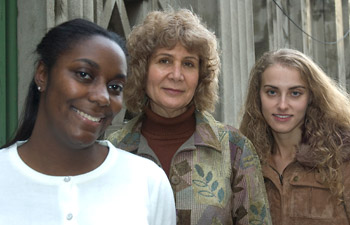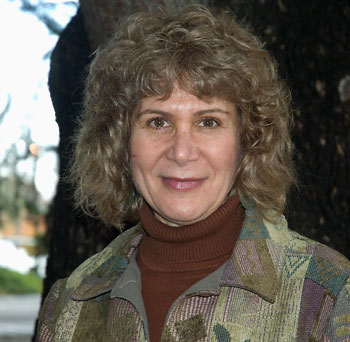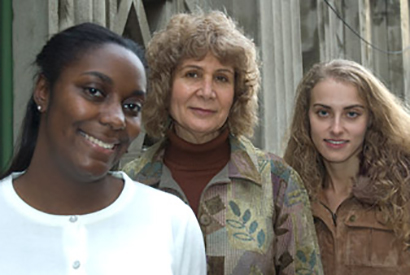Aminah Oliver spent three years as a naval jet-engine mechanic on expeditions to Middle East locations including Israel, Bahrain, and Turkey. But that experience didn’t make the prospect of transferring to Berkeley from Ohlone College in Fremont any less daunting.

Left to right: Aminah Oliver, Marjorie Weingrow, and Olga Kalashnikova (Wendy Edelstein/NewsCenter photo)
The SAGE Scholars Program, however, made the transition a lot easier. Oliver says she found “a home away from home” in the 10-year-old program, which provides career and leadership development to high-achieving students in financial need.
Oliver is among the current roster of 35 underrepresented students enrolled in SAGE, which stands for Student Achievement Guided by Experience. Pell grant recipients who have earned a minimum 3.0 GPA at Berkeley and have overcome significant obstacles in their lives are eligible to apply.
As its name suggests, the program’s emphasis is on hands-on learning.
“Unlike everything else that the students do here which is theoretical, what we do is experiential,” explains Marjorie Weingrow, its first and only executive director. Each spring SAGE scholars take a professional-development course at the Haas School of Business in which experts (including the chancellor) teach them real-world skills: business writing, professional etiquette, networking, leadership, and interviewing. The students also work one-on-one with executive and life coaches for a minimum of one semester, and meet professionals from a variety of fields who can mentor and open doors for them.
When the program began in 1999, it had financial backing from the campus and UC Office of the President. The plan was to pilot the program at Berkeley, and then expand it to the other UC campuses. Instead, its fiscal support dried up in year three, and Weingrow became the de facto fundraiser-in-chief.
She took on the Herculean fundraising task, she explains, because by then she “was hooked by these students who have overcome so much, yet they didn’t have a clue as to how to make it in a professional world.” SAGE students have “a huge challenge on this campus, because they don’t have the support they need,” says Weingrow, who is an advocate for her scholars as well as a role model. Weingrow came from a low-income background herself and says, “that makes it easier to build relationships.”
Overcoming obstacles
To keep the program afloat, Weingrow recruited an advisory board consisting mostly of diversity directors from major national and international companies, including Genentech, Kaiser Permanente, Novartis, Gap, and Merrill Lynch. In the beginning, the corporate sponsors provided internships and scholarships. In the wake of the economic downturn, though, not only have the scholarships evaporated but even securing internships has been a challenge. Weingrow also has lost her staff of three due to the campus’s previous budget cuts.

Marjorie Weingrow, executive director of the SAGE Scholars Program (Wendy Edelstein photo)
SAGE Scholars “is not just about learning professional development skills. It also challenges students to take leadership roles,” says Weingrow. “Most of the students come into the program barely looking me in the eye. Within a couple of months, they’re giving presentations to a hundred people.”
In SAGE’s professional-development course, students research careers they don’t know much about for their final project. “We want them to find out what they’re passionate about and go into it with their eyes wide open,” says Weingrow.
Oliver, for example, came to Berkeley knowing she wanted to major in Asian studies, though she was unclear about her post-graduation plans. She homed in on law, thinking a legal degree would give her the flexibility to pursue a number of options. She’s especially excited about the prospect of teaching, and plans to apply to graduate schools, including Oxford University in the UK.
Weingrow has watched Oliver grow in confidence during her tenure in SAGE Scholars. The program helped Oliver learn how to network and introduce herself to people, says Weingrow. After one of SAGE’s events, a superior-court judge commented to Weingrow that a young woman, an Asian studies student, had particularly impressed her. “Sure enough, that was Aminah,” says Weingrow with a smile.
‘A life-changer’
Like Oliver, Olga Kalashnikova is committed to discovering her passion and acting on it. “I have so many interests, it’s just hard to breathe,” says the effervescent Kalashnikova.
A linguistics student from Belarus, Kalashnikova first came to the U.S. for work so that she could send money to her family after her father became ill with diabetes. She becomes teary when recounting how she couldn’t afford an airline ticket to return to Eastern Europe for her father’s funeral when his disease proved fatal.
After attending community college in Sacramento, Kalashnikova yearned “for something bigger” and applied to Berkeley. Her first semester, she attended several workshops a day to learn about the campus’s resources. “My friends thought I was crazy,” reports Kalashnikova. “I was the happiest person on earth, because each day I was learning something new.”
Then she came across SAGE Scholars. “I needed some focus,” acknowledges Kalashnikova. “With SAGE, I have been on this huge journey of personal development.” Kalashnikova credits Weingrow and her SAGE Scholars personal coach with asking her life’s big questions: “What is it that makes you happy? What’s going to be fulfilling and meaningful to you?” Pondering such questions has been “a life-changer,” says Kalashnikova, now a political-science major.
“Marjorie expects us to be leaders,” adds Kalashnikova. “It’s not enough to have opportunity knocking on your door. You have to be prepared to meet it.” The sense of self-belief and direction Weingrow instills in her students has paid off: In SAGE Scholars’ decade of existence, every one of its enrollees has graduated with at least one job offer or gone on to graduate school.
Leading by example
Rene Garcia, who graduated from Berkeley in 2004 and now works as a human-relations manager at Macy’s in San Francisco, says the fact that Weingrow doesn’t market the program — its applicants hear about it through word of mouth — is a testament to its success.
Originally from El Salvador, Garcia attended high school in Los Angeles in a predominantly Latino neighborhood, “an ethnic enclave.” In high school, he realized two keys to success were going to college and joining a group of people who encourage one another.
Through SAGE Scholars, he landed a public-policy internship with the Oakland Chamber of Commerce that helped him determine a career in politics wasn’t for him. A second internship at Macy’s led to a job offer after graduation.
“The [SAGE Scholars] program makes it clear you have to be a hard worker, and be dedicated to achieve your goals,” says Garcia. “Knowing that has helped me grow within this company.”
Garcia’s experience has had a trickle-down effect: one of his brothers, a junior at Berkeley, is in SAGE Scholars. And his youngest brother, who will graduate high school this spring, has visited the Berkeley campus and attended Cal football games. He is also college-bound. Garcia says that in his family, “the expectation is now set that there’s high school and then college. Before I went to college, the expectation wasn’t there, because no one was leading the way.”
Weingrow’s work was acknowledged in November with a Jefferson Award, presented by the American Institute for Public Service and awarded nationally and locally. The award honors ordinary individuals for exemplary community and public service.
“These students inspire me,” she says.
And cutbacks aside, “the need for this program is greater than ever,” says Weingrow, noting that she was inundated with several hundred applications last year. And little wonder: Those students fortunate enough to be in the program, she says, “are thriving, getting jobs and into graduate school, and impressing everyone they meet.”
